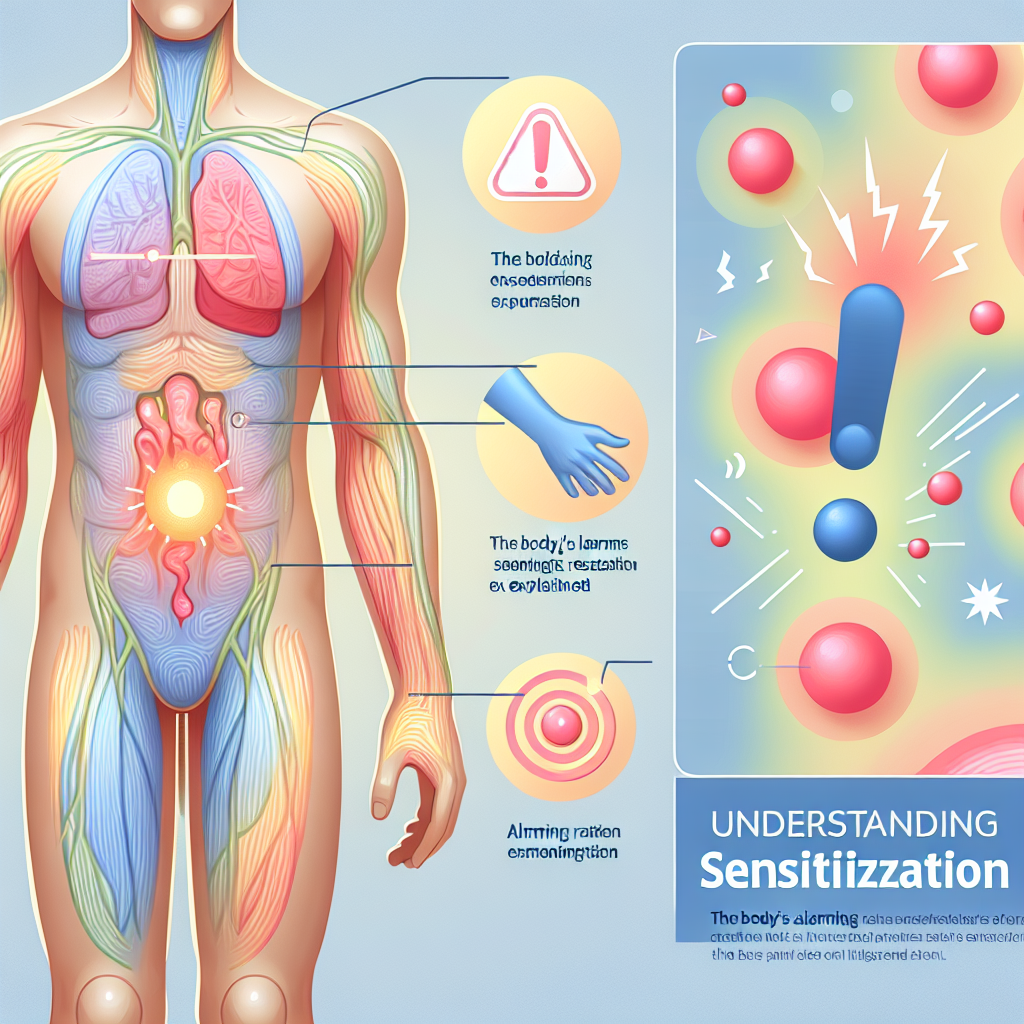Introduction
Have you ever experienced a seemingly innocuous trigger that led to an intense reaction from your body? Whether it’s a runny nose from pollen or an unexpected rash from a new detergent, these responses can feel alarming and are often linked to a phenomenon known as sensitization. Understanding sensitization: the body’s alarming reaction explained shines a light on this critical aspect of our immune system and why it matters.
Sensitization occurs when our body becomes hyper-reactive to specific substances, which can lead to allergies or intolerances over time. In this comprehensive guide, we will explore what sensitization is, how it develops, its implications for our health, and actionable steps you can take to manage sensitivities effectively.
What is Sensitization?
Defining Sensitization
Sensitization refers to the process by which the immune system becomes reactive to a previously harmless substance, termed an allergen. This response can develop after initial exposure, leading to heightened reactions upon subsequent encounters. When your body encounters an allergen, it learns to recognize it, potentially resulting in symptoms ranging from mild annoyance to severe medical emergencies.
The Immune System’s Role
The immune system comprises a complex network of cells and organs that work together to protect the body. When sensitization occurs, certain immune cells, particularly immunoglobulin E (IgE), play a crucial role. Upon contact with an allergen, these cells trigger inflammatory responses, causing symptoms such as sneezing, itching, or even more severe responses like anaphylaxis.
The Science Behind Sensitization
How Does it Happen?
Understanding sensitization: the body’s alarming reaction explained requires diving into immunology. During the first exposure to an allergen, the immune system produces a specific type of antibody—IgE. This antibody binds to mast cells, which release histamines when re-exposed to the allergen.
The Process Overview
- Initial Exposure: The immune system mistakenly identifies a harmless substance as a threat.
- IgE production: The body produces immunoglobulin E antibodies.
- Sensitization Phase: The antibodies bind to mast cells, preparing the body for future exposures.
- Subsequent Exposure: On re-contact, the allergen triggers these mast cells to release histamines and other chemicals, leading to an allergic reaction.
Factors Contributing to Sensitization
Genetics
Genetic predisposition plays a significant role in sensitization. If allergies run in your family, your chances of developing sensitivities are higher.
Environmental Influences
Exposure to potential allergens during childhood—such as pet dander, pollen, or certain foods—can influence the likelihood of sensitization. Changing environments might also present new allergens, increasing the risk of developing sensitivities.
Real-World Implications of Sensitization
Case Study: The Rise of Allergies
A surge in allergic conditions, particularly among children, illustrates the implications of sensitization. Research published by the American Academy of Allergy, Asthma & Immunology highlights that the prevalence of food allergies has increased by over 50% in the past two decades.
Analysis
This case emphasizes environmental triggers, lifestyle changes, and the hygiene hypothesis—the idea that reduced exposure to infectious agents in early childhood can lead to a higher risk of allergies. Understanding sensitization in this context is essential for developing effective public health strategies.
Managing Sensitization: Strategies
Identify Triggers
Recognizing allergens is the first step in managing sensitization. This might involve keeping a symptom diary to identify which foods or environmental factors provoke symptoms.
Allergen-Avoidance Techniques
- Environmental Control: Regular cleaning, using air purifiers, and minimizing exposure to known allergens can significantly help.
- Dietary Changes: For food-related sensitivities, gradually eliminating suspect foods can lead to improved wellbeing.
Medical Interventions
Allergy Testing
Consulting an allergist for skin or blood tests can help clarify which substances may be causing issues. This knowledge can empower you to take appropriate action.
Immunotherapy
For certain allergies, immunotherapy may help desensitize the immune system over time. This treatment involves exposure to gradually increasing amounts of the allergen, with the goal of reducing sensitivity.
Conclusion
Understanding sensitization: the body’s alarming reaction explained reveals the complex interplay between our immune system and environmental factors. Recognizing how sensitization occurs and implementing effective management strategies can drastically improve quality of life for those affected.
By identifying triggers, employing avoidance techniques, and seeking medical advice, individuals can take proactive steps to navigate their sensitivities. As science continues to uncover the nuances of sensitization, staying informed and engaged is essential for maintaining a healthy lifestyle.
FAQs
1. What are common symptoms of sensitization?
Common symptoms include sneezing, itching, skin rashes, gastrointestinal disturbances, and even severe reactions like anaphylaxis.
2. How can I identify if I am sensitized to a substance?
Keeping a detailed diary of symptoms and possible triggers can help. Allergy tests conducted by a healthcare professional are highly recommended.
3. Can sensitization develop later in life?
Yes, sensitization can occur at any age, even if you have previously tolerated a substance without issue.
4. Are there preventive measures I can take to avoid sensitization?
You can reduce exposure to known allergens, maintain clean environments, and consult with healthcare professionals for advice tailored to your lifestyle.
5. Is sensitization reversible?
In some cases, particularly if allergens are removed, symptoms may lessen over time. Immunotherapy can also help desensitize individuals.
By equipping yourself with knowledge about sensitization, you take the first crucial steps towards a healthier, more informed life. Remember, the journey towards understanding your body is empowering and significant.

